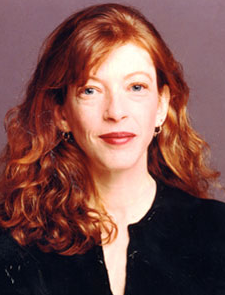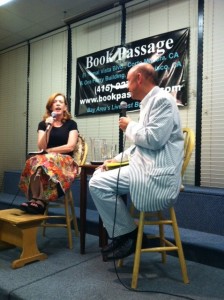I just spent the past few days at the 21st Annual Book Passage Travel Writers & Photographers Conference. I was on a panel with Andrew McCarthy, who made his name as an actor in “Pretty in Pink,” “St. Elmo’s Fire,” and “Less Than Zero,” and is now an award-winning travel writer for National Geographic Traveler and other publications. I also discussed the “Art of Attention” on a panel with veteran travel writers David Farley, Larry Habegger, and Georgia Hesse.
But my biggest thrill was the chance to meet author and New Yorker writer Susan Orlean, who was just as delightful in person as she is in her books such as Rin Tin Tin, The Orchid Thief (which became the movie Adaptation, starring Meryl Streep cast in the role of the Orleans character,) The Bullfighter Checks Her Makeup, and My Kind of Place. In introducing Susan, Book Passage President Elaine Petrocelli noted that when a New Yorker arrived at her home with a new story by Susan in it, her husband Bill knew to leave her in peace until she’d finished it.

Author and New Yorker staff writer Susan Orlean, who was the keynote speaker for the 21st annual Book Passage Travel Writers & Photographers Conference
I feel the same way. These days, when a new edition of the New Yorker hits my ipad with a story by Susan Orlean in it, I’ll read it first thing (though a close second is anything by David Grann, who wrote The Lost City of Z and a remarkable recent piece about an American who took part in the Cuban revolution entitled “The Yankee Commandante.”) Susan has a gift for looking at something seemingly ordinary – a supermarket in Queens, N.Y., for example – and carrying her along with us as she discovers deeper truths about her subjects and the world through it.
With lovely ginger hair and wearing a playful floral skirt, Susan told a packed audience of more than a hundred people on a Saturday night that she starts her stories with authentic curiosity about her subject. She found herself landing in the baking oil town of Midland, Texas, at one point with no idea at first how to understand it. But her questions drove her: why would people settle in a town where the air seemed “dry-roasted” and the earth was so hard that gravediggers needed jackhammers to bury a casket? What would the town reveal about George W. Bush, who once said in an interview that if people “want to understand me, (they) need to understand Midland…”? So Susan, pursuing the answer to that question, flew to Midland in an experience she called “sort of an emotional Outward Bound” — choosing to arrive unprepared so as to remain open to the place, yet as a result feeling “panic, despair, and existential loneliness.”
She soon met a man in a coffee shop took her under his wing and became her guide to Midland for the next three days. (Click here to read her story, “A Place Called Midland.”) Reluctant to begin an encounter with someone by taking notes, she prefers to observe and listen carefully. “What’s important is paying attention.” As for using a tape recorder, she’s not a fan, noting that they can’t capture the texture of a place or the emotions behind someone’s words.
Curiosity isn’t enough, of course, And Susan employs what she calls “stagecraft” – the art of performance, as the writer unfolds and paces a story, controlling the highs and the lows, and building in suspense and surprises. Had she not become a writer, “I think my other career path would have been as a stripper,” she joked to Don George, the conference’s self-described “Papa” and co-founder in conversation with her last night. Her point was that a successful storyteller – like a skilled stripper –slowly reveals the story’s surprises, rather than ripping all her clothes off at once and standing there naked. The pleasure is in the control. (The image of Susan pole dancing somehow came up in the conversation – delightfully making Don lose his train of thought and his cheeks turn pink!)
Someone in the audience asked Susan what she meant by stagecraft. “I think writing is performance,” she said, “and it is important to imagine it being performed.” She went on to explain that the experience of reading is a rhythmic and paced experience and she shared advice that I used throughout the many drafts of my latest book, Lost Kingdom: “The Number one thing you should do with your writing is to read it out loud.” Very, very good advice, as often you can’t spot problems in the language or the rhythm purely by looking at words on a screen or a page. You have to hear and feel it.
How do you start your stories, another person asked her. Often, an image or a phrase comes to mind. In the case of her story on Midland, Texas, the idea began with George Bush’s quote about understanding him through understanding the town. Then, for Susan, it was the image of needing a jackhammer to get buried that stuck with her. It seemed like a place that people really shouldn’t live in – but did, because of the promise of getting rich from oil there. In her latest book, Rin Tin Tin, which I’ve just started, it was the word “immortality” that stuck – the way that this iconic German Shepherd, who’s been dead for more than half a century, still lives through film, books, and other images.
After her talk, Susan’s fans waited in a long line to get their books signed. When she finished that, the conference folks surrounded her, eager to hear more about the affair she’d had with a guide in Bhutan during an earlier panel called “Lust in Translation” (she was in the audience, but had been asked, at one point, to share her experiences.) My author friends Allison Hoover Bartlett, who wrote The Man Who Loved Books Too Much, and Cara Black, who writes the Aimee LeDuc investigation series, as well as our physician writer friend Katherine Neilan, all made the trek from San Francisco to hear Susan. And, despite San Francisco Chronicle travel editor Spud Hilton‘s best efforts to corral us into karaoke, it was too late to stay. Still, we all agreed it was well worth it – with many thanks to Book Passage, Don George, and everyone who made this wonderful conference possible.

 Candace Rose Rardon says
Candace Rose Rardon says
August 14, 2012 at 1:13 amWhat a perfect write-up of Susan’s talk, Julia. It was wonderful to meet you this weekend at Book Passage, and I so enjoyed hearing about your writing process across several panels. Hope to see you at BP next year!
 Lily says
Lily says
August 14, 2012 at 1:56 pmWonderful write-up and one of my many favorite and inspiring moments of the conference!